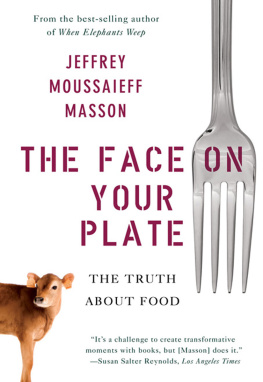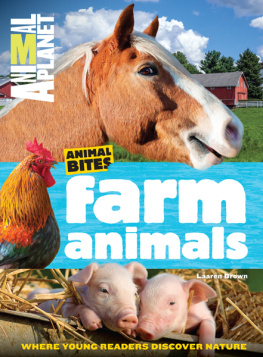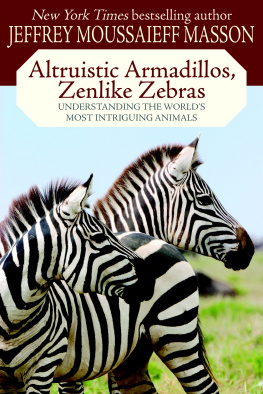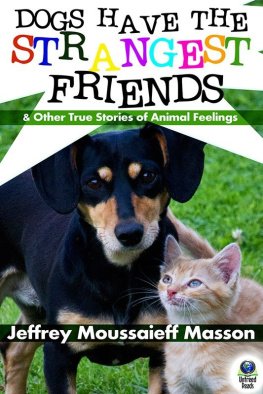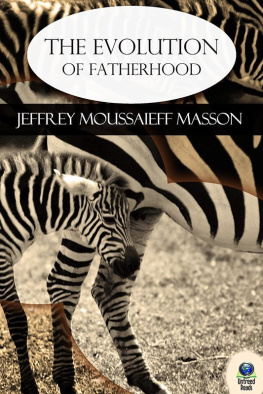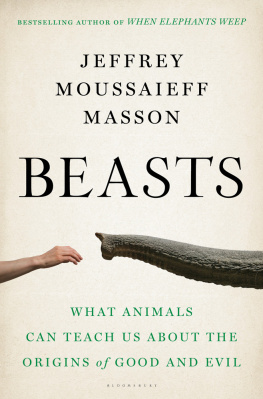A LSO BY J EFFREY M OUSSAIEFF M ASSON
Altruistic Armadillos, Zenlike Zebras:
A Menagerie of 100 Favorite Animals
Raising the Peaceable Kingdom: What Animals Can Teach Us About the Social Origins of Tolerance and Friendship
The Cat Who Came in from the Cold: A Fable
Slipping into Paradise:
Why I Live in New Zealand
The Pig Who Sang to the Moon:
The Emotional World of Farm Animals
The Nine Emotional Lives of Cats:
A Journey into the Feline Heart
The Evolution of Fatherhood:
A Celebration of Animal and Human Families
Dogs Never Lie About Love:
Reflections on the Emotional World of Dogs
The Wild Child:
The Unsolved Mystery of Kaspar Hauser
When Elephants Weep:
The Emotional Lives of Animals (with Susan McCarthy)
My Fathers Guru:
A Journey Through Spirituality and Disillusion
Final Analysis:
The Making and Unmaking of a Psychoanalyst
Against Therapy:
Emotional Tyranny and the Myth of Psychological Healing
A Dark Science:
Women, Sexuality, and Psychiatry in the Nineteenth Century
The Assault on Truth:
Freuds Suppression of the Seduction Theory
The Oceanic Feeling:
The Origins of Religious Sentiment in Ancient India
The Complete Letters of Sigmund Freud to Wilhelm Fliess, 18871904 (editor)
The Peacocks Egg: Love Poems from Ancient India
(editor; translations by W. S. Merwin)
The Dhvanyaloka of Anandavardhana with the Locana of Abhinavagupta (translator, with D. H. H. Ingalls and M.V. Patwardhan)
Avimaraka: Loves Enchanted World
(with D. D. Kosambi)
Aesthetic Rapture: The Rasadhyaya of the Natyasastra, 2 vols. (translator and editor with M.V. Patwardhan)
Santarasa and Abhinavaguptas Philosophy of Aesthetics
(with M.V. Patwardhan)
Dogs Have the Strangest Friends, & Other True Stories of Animal Feelings
(for children)
THE FACE ON YOUR PLATE
The Truth About Food
J EFFREY M OUSSAIEFF M ASSON

W. W. NORTON & COMPANY
NEW YORK LONDON
Muse des Beaux Arts, copyright 1940 & renewed 1968
by W. H. Auden, from Collected Poems by W. H. Auden.
Used by permission of Random House, Inc.
Copyright 2009 by Jeffrey Moussaieff Masson
All rights reserved
For information about permission to reproduce selections from this book, write to Permissions, W. W. Norton & Company, Inc., 500 Fifth Avenue, New York, NY 10110
Production manager: Anna Oler
Library of Congress Cataloging-in-Publication Data
Masson, J. Moussaieff (Jeffrey Moussaieff), 1941
The face on your place: the truth about food/
Jeffrey Moussaieff Masson.1st ed.
p. cm.
Includes bibliographical references and index.
ISBN: 978-0-393-07350-8
1. Food of animal origin. I. Title.
TX371.M37 2009
641.3'06dc22 2008052733
W. W. Norton & Company, Inc.
500 Fifth Avenue, New York, N.Y. 10110
www.wwnorton.com
W. W. Norton & Company Ltd.
Castle House, 75/76 Wells Street, London W1T 3QT
To Leila, whose love and knowledge has brought me closer to all the creatures in our world and to greater health and happiness; and to my beloved children, Simone, Ilan, and Manu, shining examples of compassion for all living beings.
ACKNOWLEDGMENTS
A NUMBER OF PEOPLE PROVIDED ME WITH INFORMATION on the research in the field, which has proved invaluable. I want to thank them for their help. They are: Neal Barnard, Culum Brown, T. Colin Campbell, Matthew Cole, Antonia Demas, Gidon Eshel, Gary Fraser, Bruce Friedrich, Phil Gee, Kristen Hawkes, Padmanabh Jaini, Tim Key, Hans Kriek, Philip Lymbery, Karen Morgan, Jeff Nelson, Ingrid Newkirk, Christine Nicol, Jeff Novick, Wayne Pacelle, David Pimentel, Vaclav Smil, and Kim Sturla. For graciously agreeing to interviews I am grateful to John Coetzee, Caldwell B. Esselstyn, Temple Grandin, Francis Moore Lapp, John Mackey, John McDougall, Milton Mills, Michael Pollan, Stan Sesser, and Alice Waters. Special thanks go to my friends Jenny Miller and Marti Kheel, who read every line and made many transformative suggestions that improved the book immeasurably, as well as the wise Michael Greger, who did the same. I also wish to thank my agent Miriam Altshuler, who believed in this project from the start and worked hard to make this book a success, and her assistant, Jake Nabel, for much help. At Norton I want to thank Amy Cherry, the perfect editor (who added wonderful phrases and discreetly took out those that were not so wonderful), and her assistant, Erica Stern, on whom I could always rely. In addition I want to thank all the team at Norton who worked on my book, Deborah Morton-Hoyt, Chin-Yee Lai, Anna Oler, and Nancy Palmquist. A very special thanks to Ann Adelman, who has a special touch and made little magical changes that delighted. Finally, this book would not have been possible without the love and intelligence of my soul mate, Leila Masson.
Introduction
THE GOLD STANDARD IS GREEN
W HEN I WAS TEACHING S ANSKRIT AT THE U NIVERSITY of Toronto in the 1970s, I came across a phrase that stopped me dead: ashrayaparavrtti a sudden moment of life-changing insight. Paravrtti is like a somersault, and ashraya is ones home base, so it means letting go of everything you have always believed or understood for a leap into the unknown. The Christian equivalent is known as the Road to Damascus experience in which Saul (later St. Paul) underwent a conversion on his way to Damascus to slaughter Christians and instead became one.
Many people become vegan in just that way: a sudden moment, a blinding insight, a turning ones back on conventional wisdom, in this case, conventional diet. How did it happen for me? Well, I had the good fortune to grow up in a vegetarian family: my parents were disciples of a vegetarian guru, Paul Brunton. Even when I gave up the belief in the Hinduism and Buddhism that he taught, I still maintained my belief in the value of ahimsa, not doing harm, which included not doing harm through ones diet. Later, at Toronto, I had a negative epiphany: what was I doing teaching this language that had lost its magic for me? I entered psychoanalytic training. Alas, giving up Sanskrit somehow entailed giving up my vegetarian ways. One day, after becoming a Freudian psychoanalyst, I had another transformative moment: I was sitting at Freuds desk at Maresfield Gardens in London. I opened one of the drawers, and found a stash of letters, all of which dealt with the hidden reality of the sexual abuse of children. That was to become my concern (some would call it an obsession) over the next ten years. Only when I decided that I could no longer be a psychoanalyst in good conscience did I reconnect with my former vegetarian self: I started investigating the emotional lives of animals, and what I learned turned me back into a lifelong vegetarian.
During that time, I can remember hearing Csar Chvez say that if you want to lessen animal suffering, you would do better to eat meat and give up dairy and eggs. Again, one of those defining moments for me. Everything I thought I knew was suddenly challenged, but I also knew that I was not yet ready for such a challenge. I turned my back on that moment. Yet I understood even then that sooner or later I would have to face up to what I could no longer ignore.
That moment came for me when I began to visit dairy farms and hen-laying facilities and saw the misery and suffering that the animals endured just so that we could enjoy their milk and eggs. My denial was no longer possible, and I took the leap. I have asked some other vegans how it happened for them, and got some interesting answers. John Mackey, the CEO of Whole Foods, told me: I remember one day in August of 2003 I made the decision to become (near) vegan and that once the decision was made I felt great emotional alignment within my heart. I knew this was the right thing for me to do and I also knew that I was making a decision that I would be committed to for the rest of my life. At last my beliefs and my ethics had come into alignment. Stanley Godlovitch, one of the people who began the back-to-vegetarianism movement in the 1970s (he and a friend first confronted Peter Singer, then a graduate student in philosophy at Oxford and now the best known animal rights author, about eating meat), told me recently that every vegetarian who drinks milk or eats eggs knows from scratch that theres something not quite right. But for him and his wife, the push came from our teenage son Daniel, who brought out the ancient Consistency Cannon over dinner and fired at will. I guess I must have been poised, ready, and that was it.

